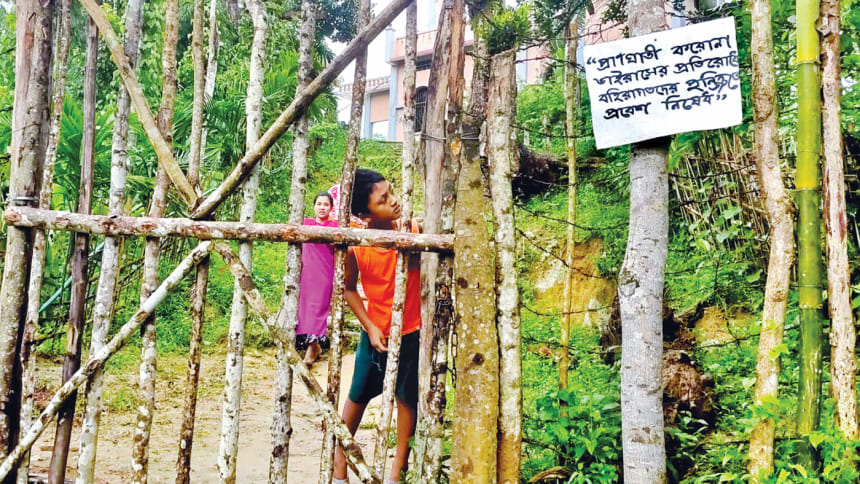How 90 indigenous villages in Sylhet region keep coronavirus at bay

No Covid-19 patients have been found so far in 90 punjis (villages) in Sylhet, with each completely isolating itself from outsiders and following strict hygiene protocols.
In the rest of the division, 8,497 Covid-19 cases were reported and 153 patients died as of yesterday.
Dr Anisur Rahman, assistant director of the health department in Sylhet division, told this correspondent that there have been no Covid-19 cases so far in the punjis unlike the rest of division.
He termed the complete lockdown and hygiene protocols being employed in the punjis as exemplary. "It is a very good practice; anyone can follow it as an example."
Saju Marchiang, publicity secretary of the Khasi Welfare Association, said entry to the punjis for outsiders has been stopped since the government announced the countrywide shutdown back in March after the country's first coronavirus cases were detected.
In each punji, people are under strict guard with only those sick able to leave. Residents of the punjis who have been elsewhere have to maintain a 14-day quarantine outside before they can enter. Not even relatives of the residents have been allowed in during this time.
These measures have paid off as no one has so far been found to be affected by coronavirus in the punjis.
Isolation from the outside world was crucial for these indigenous communities as the nearest healthcare facilities are distant, said local leaders.
Flora Bably Talang, general secretary of Kubraj, an inter-punji development organisation, said there is a population of around 40,000 who mostly live in hilly punjis in Sylhet division.
"We suffer badly at times due to the poor condition of hilly roads and no electricity facilities. There are so many remote punjis where there are no modern facilities."
"But," he added, "we are following strict health rules during this pandemic for our own safety."
On Thursday, this correspondent was able to secure a visit to three punjis, with special permission and under special arrangement. The nearest of the villages is around 50km from Moulvibazar town.
In the first punji, this correspondent was able to enter through the only open gate and was sprayed down by guards on duty before being allowed in.
Needless to say, he had to keep wearing gloves and a mask all the time and did not enter any house.
"After meeting with all residents, we have been maintaining a complete lockdown with no exceptions," said Welcome Lymba, a resident of Jaflong punji in Gowainghat upazila of Sylhet.
This includes a ban on tourists, who sometimes stray from the popular hill station in Jaflong into the punjis.
Dipu Rema, a resident of Dhanchhara punji in Sreemangal upazila of Moulvibazar, said they met everyone in the village on implementing the lockdown, so that no one is given any special concessions.
"If Covid-19 is able to enter our area, everyone will be severely affected."
Monika Khonglah, myntri (head) of Megatila punji in Kulaura upazila of Moulvibazar, said even sacks of rice and pulses bought from outside are sprayed and kept in a hut adjacent to the punji gate for a week, as a precaution against the virus.
Father Joseph Gomes OMI, central committee member of Bangladesh Paribesh Andolon, and his team are also working in the punjis to spread awareness, under the leadership of Bishop Bejoy N D'Cruze, head of the Sylhet Diocese.
"We are running from one punji to another -- advising everyone to wear masks, maintain social distancing, and adhere to hygiene rules," said Father Joseph.
He said they themselves maintain strict hygiene and use protective gears during the campaigns.
Another precaution has been stopping gathering for public worship in the punjis during the last few months, he added.
ATM Farhad Chowdhury, UNO of Kulaura upazila in Moulvibazar, said the punji residents have been extremely sincere about the Covid-19 issue.
"Their strict rules make us proud. We are also helping them carry out various activities to increase social awareness, including making it compulsory to wear a mask."

 For all latest news, follow The Daily Star's Google News channel.
For all latest news, follow The Daily Star's Google News channel. 



Comments